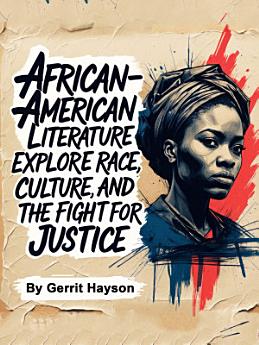African-American Literature: Explore Race, Culture, and the Fight for Justice
About this ebook
The roots of this literary tradition stretch back to the oral traditions brought from Africa, where storytelling served as a vital means of preserving history, transmitting cultural values, and maintaining community bonds. These oral traditions, rich with proverbs, folktales, and songs, would prove instrumental in sustaining the spirits of enslaved Africans in the New World. When formal literacy was forbidden to the enslaved population, these oral forms became vehicles of survival, resistance, and cultural preservation.
The transition from oral to written expression marked a pivotal moment in the development of African-American literature. The earliest published works by African Americans appeared in the eighteenth century, beginning with the poetry of Phillis Wheatley and Jupiter Hammon. These pioneering authors faced the dual challenge of mastering European literary forms while expressing their unique experiences as Africans in America. Their works demonstrated not only intellectual capability but also challenged prevailing notions about the humanity and potential of African Americans.








